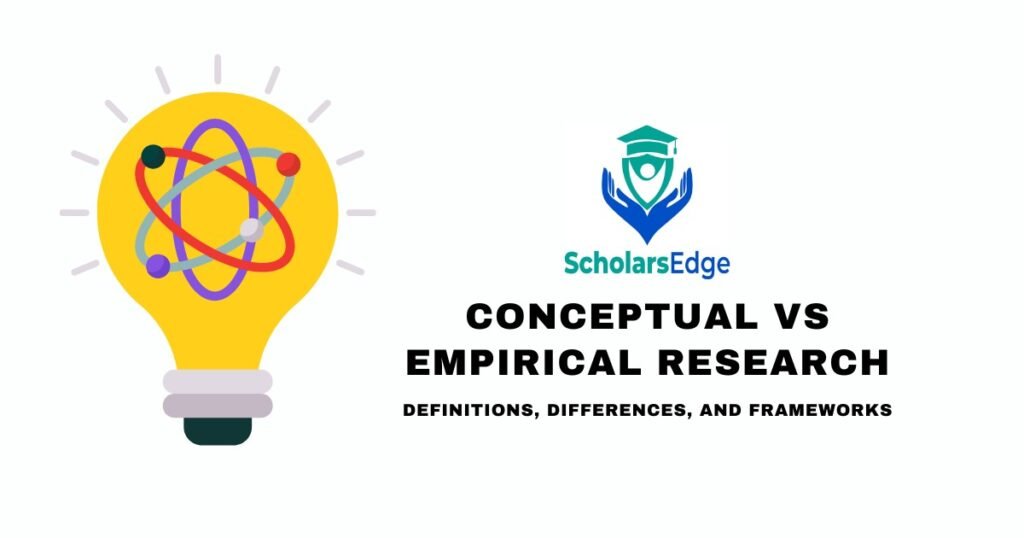
Research methodologies are fundamental to the advancement of scientific knowledge. Conceptual and empirical research are distinct approaches, each with its unique focus and methodology. This section will explore these two types of research, providing definitions and examples to elucidate their differences and applications, in sort understanding Conceptual vs Empirical Research.
Definition of Conceptual Research
Conceptual research primarily focuses on abstract ideas and theories rather than empirical observation. This type of research involves synthesizing and analyzing existing knowledge to formulate new theoretical insights or reinterpret existing ones without direct observation or experimentation.
Focus on Abstract Ideas and Theories: Conceptual research delves into abstract concepts to propose new theories or provide a novel interpretation of existing theories. It leverages deductive reasoning and logical analysis to explore and expand the theoretical framework of a subject.
Examples of Conceptual Research in Various Fields:
Philosophy: Immanuel Kant’s “Critique of Pure Reason” is an exemplary piece of conceptual research, offering a foundational analysis of metaphysics and epistemology without empirical investigation.
Mathematics: The development of non-Euclidean geometry by mathematicians like Lobachevsky and Bolyai, which redefined traditional notions of space using theoretical models, not empirical evidence.
Economics: John Maynard Keynes’ formulation of Keynesian economics was initially a conceptual framework that adjusted the existing economic theories to explain periods of economic downturn better.
1. Definition of Empirical Research
In contrast, empirical research is based on direct observation or experience, relying on experimental and observational methods to collect data that can inform scientific theories. This approach is fundamental in fields where practical experiments and observations are used to test hypotheses and develop new knowledge.
Based on Observation and Experimentation: Empirical research requires data collection through direct observation or experimentation. This approach ensures that theories are tested against observable reality, grounding theoretical insights in empirical evidence.
Examples of Empirical Research in Action:
Biology: Charles Darwin’s use of empirical evidence from his voyage on the HMS Beagle led to the development of the theory of natural selection.
Physics: The use of particle accelerators to observe subatomic particles directly, testing theoretical predictions about particle physics.
Psychology: Using controlled experiments, like the Stanford prison experiment, to observe human behavior in simulated conditions.
2. Differences Between Conceptual and Empirical Research
To clarify the distinctions between conceptual and empirical research, the following table summarizes the main differences based on several key attributes:
| Attribute | Conceptual Research | Empirical Research |
| Definition | Involves research that is based on theorizing and synthesizing ideas and concepts without direct observation or experimentation. | Involves research that is based on direct observation, experimentation, and the collection of measurable evidence. |
| Focus | Abstract ideas, theories, and conceptual understanding. | Observable phenomena, data collection, and empirical evidence. |
| Nature of Data Used | Uses existing theoretical data and literature; relies on secondary data to form hypotheses and frameworks. | Generates new, primary data through direct observations and experiments; relies on measurable and observable data. |
| Methodologies Involved | Analytical and interpretative methods, including literature review, theoretical synthesis, and logical reasoning. | Experimental methods, including controlled experiments, surveys, observations, and statistical analysis. |
| Purpose | To clarify, reinterpret, or propose new theoretical frameworks; to organize and synthesize existing knowledge. | To test hypotheses, validate theories, and discover new patterns or phenomena through empirical evidence. |
| Data Collection | No direct data collection; the study uses existing data and information from various sources. | Involves active data collection, including using instruments and measurements to gather new data. |
| Analysis | Primarily qualitative, focusing on identifying patterns and constructing theoretical propositions. | Can be both qualitative and quantitative; focuses on statistical analysis and testing to derive conclusions from the data. |
| Outcome | Produces theoretical insights and expands understanding through new models or frameworks. | Produces empirical evidence that supports or refutes hypotheses, contributing to the body of factual knowledge. |
| Examples | – Developing theories of social behavior. – Formulating new economic models based on existing data. | – Observing behavioral changes in response to a new educational method. – Conducting clinical trials to test a new drug. |
3. Understanding Conceptual Frameworks in Research

A conceptual framework plays a crucial role in both types of research, particularly in guiding the research design and interpretation of data in complex studies.
What is a Conceptual Framework?
A conceptual framework is a coherent system of concepts, assumptions, expectations, beliefs, and theories supporting research. It serves as a map that guides the research by clarifying the key variables and their presumed relationships.
Definition and Role in Research:
A conceptual framework helps to organize the research questions, design, and methodology by providing a precise model of the relationships among the variables involved. It ensures the research has a solid theoretical base and a clear investigatory pathway.
How It Guides Research Questions and Design:
The conceptual framework helps shape the research questions and influence the study’s design by delineating the key variables and hypothesized relationships. It ensures that the research objectives are clearly mapped and aligned with the broader theoretical issues.
Components of a Conceptual Framework
Key Variables and Hypotheses: Identifies the specific variables being studied and their hypothesized relationships. For example, in a study on the impact of social media on youth, key variables might include hours spent on social media, academic performance, and anxiety levels.
The Role of Background Literature: Background literature utilizes existing research and theories to justify the selection of variables and the proposed relationships. It helps to ground the conceptual framework in existing knowledge, providing a rationale for the expected relationships and guiding the development of research hypotheses.
4. Conceptual vs. Theoretical Frameworks
While often used interchangeably, conceptual and theoretical frameworks serve different roles in research.
Definition of Theoretical Framework

A theoretical framework is based on tested and validated theories. It serves as the foundation for identifying which theories will guide the research, the relationships between the variables, and the formulation of hypotheses.
How It Underpins the Study with Existing Theories:
The theoretical framework involves applying specific theories, often from different fields, to frame the research question and interpret the findings. For example, a theoretical framework might use Piaget’s stages of cognitive development to analyze how children learn in educational settings.
Differences and Similarities
Conceptual frameworks are typically developed as initial models to guide the early stages of research, helping to identify key variables and hypotheses. In contrast, theoretical frameworks are based on existing theories and are used to interpret data after empirical research. Despite these differences, both frameworks aim to clarify relationships among key variables and guide research by providing a structured approach to understanding the studied phenomena, ensuring research is grounded in and contributes to theoretical knowledge.
When to Use Each Framework:
Conceptual frameworks are used when existing theories are insufficient to explain new phenomena or when a study aims to reinterpret or extend theoretical approaches, guiding the initial exploration of variables and hypotheses. Theoretical frameworks are utilized when a well-established theory can be directly applied to a research problem, often used to interpret data after empirical research. Both frameworks aim to clarify relationships among key variables and guide the research process, providing structured approaches to understanding the studied phenomena.
Examples Illustrating Their Use in Research:
A conceptual framework is used in studies where established theories may not sufficiently explain new phenomena. For instance, a survey of the role of innovation in small businesses might develop a conceptual framework incorporating variables like organizational culture, market dynamics, and technology adoption without initially applying a specific established theory. This helps explore and identify key variables and formulate initial hypotheses, setting the stage for empirical investigation.
Conversely, a theoretical framework is applied when a well-established theory can be directly used to address the research problem. An example is research on voter behavior, where the Theory of Planned Behavior is used to model how attitudes, subjective norms, and perceived control influence voting intentions. This approach uses existing theories to interpret the data after conducting empirical research. Both frameworks are essential in providing a structured research approach, clarifying relationships among key variables, and guiding the process to enhance scientific knowledge and understanding.
5. How to Develop a Conceptual Framework
Developing a conceptual framework is a critical step in the research process, particularly in qualitative research, where integrating theoretical and empirical observations is foundational. This section outlines a step-by-step guide to creating a robust conceptual framework, identifying key variables, establishing relationships, and using appropriate tools and techniques.
Step-by-Step Guide to Creating Your Framework
| Steps | Descriptions |
| Identifying Key Variables | Identify the main elements influencing your research question. |
| Literature Review | Gather information about your research topic. |
| Theoretical Orientation | Use theory to guide which variables are essential. |
| Establishing Relationships | Define how variables might affect each other. |
| Hypothesis Development | Formulate propositions about the relationships to be tested. |
| Concept Mapping | Visually organize the relationships between variables. |
6. Examples of Conceptual Frameworks in Qualitative Research
Conceptual frameworks play a vital role in qualitative research by providing a structured lens through which the study is conducted. This section presents a case study as an example of a conceptual framework in action and discusses how these frameworks inform qualitative research.
Case Study: Example of a Conceptual Framework in a Qualitative Study
Study Overview: The study examined how social media influences teenagers’ self-esteem. The key variables identified were social media usage, peer influence, and self-esteem levels.
Framework Development:
This conceptual framework examines how social media usage and peer influence affect teenagers’ self-esteem. Social media usage, measured by time spent and engagement, negatively impacts self-esteem. This is because teenagers are exposed to more peer comparisons online, leading to feelings of inadequacy. However, the framework suggests that positive peer influence can moderate this relationship. In other words, supportive online and offline interactions with peers can buffer the negative effects of social media on self-esteem.
Conceptual frameworks are particularly valuable for qualitative research. Defining key elements and their hypothesized connections ensures research methods align with the study’s goals. Additionally, they provide a foundation for interpreting data, allowing researchers to explore the “why” behind the “what” and draw more profound insights into the phenomenon under investigation.
7. Practical Tips and Common Mistakes
Developing an effective conceptual framework requires careful thought and a structured approach. Below are practical tips and common pitfalls to avoid during this process.
Tips for Developing Effective Conceptual Frameworks
| Do’s | Don’ts |
| Ensure your framework is grounded in a solid theoretical base supported by current literature. | Address and explore any contradictions between your theoretical framework and empirical findings. |
| Aim for clarity in illustrating how each variable fits into the framework and the nature of their relationships. | Consider and articulate potential alternative explanations for the relationships in your framework. |
| As your understanding evolves, be prepared to refine and adjust your framework | Avoid adding too many variables or overly complex relationships that make the framework challenging to understand and operationalize. |
8. Conclusion
Conceptual and empirical research, though distinct in methods (theory vs. data), work together to explore and explain phenomena. One builds theories; the other tests them. Researchers who thoughtfully use both frameworks can create stronger, clearer studies that ultimately improve our understanding of complex issues.
FAQS About Conceptual vs Empirical Research
What is a conceptual framework in qualitative research?
In qualitative research, a conceptual framework acts like a roadmap that guides your study. It clarifies the key concepts (variables) you’ll explore, how they might relate and the theoretical underpinnings that inform your research question. It helps you analyze your qualitative data (interviews, observations, etc.) through the lens of these defined relationships.
How does a conceptual framework differ from a theoretical one in practical terms?
Scope: A conceptual framework is more specific to your research question, focusing on the variables and relationships you’re investigating. A broader theoretical framework outlines general principles and concepts within a discipline.
Development: A conceptual framework is often developed during research, informed by your literature review and evolving understanding. A theoretical framework is usually pre-established within a particular field.
Purpose: A conceptual framework helps you make sense of your qualitative data and draw conclusions. A theoretical framework provides a foundation for interpreting your findings within a larger body of knowledge.
Can empirical research have a conceptual framework?
Yes! While less common, empirical research (quantitative studies) can benefit from a conceptual framework. It helps you define the variables you’ll measure, how they might influence each other, and the hypotheses you want to test.
